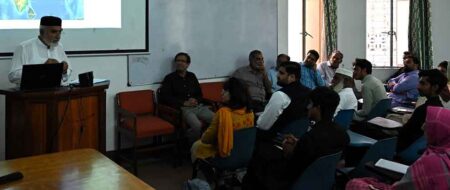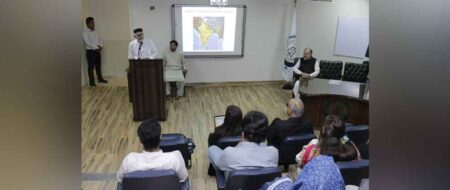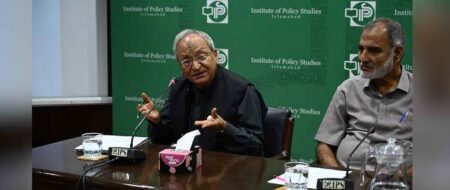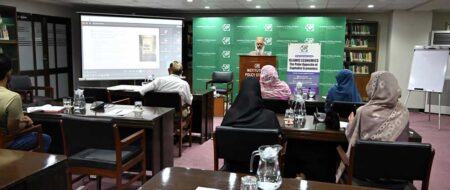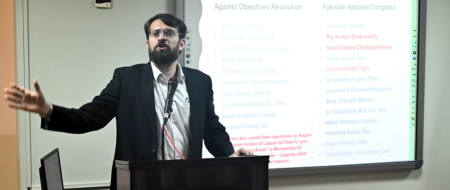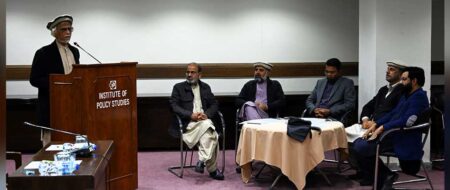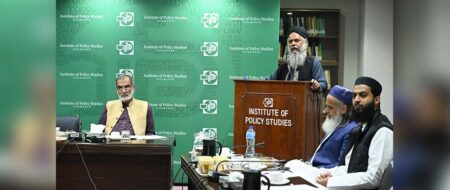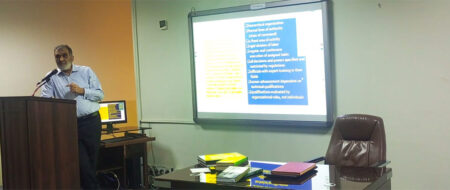An insight into Chinese Society
Seeking to promote an insight into the society of China, Institute of Policy Studies (IPS) held the third and last session of lecture series ‘Understanding China’ on May 13, 2010. The program commenced with brief remarks by DG IPS Khalid Rahman, who threw light on the society of China in context of “Opening up Policy” initiating from 1980s. He highlighted that on one hand under the idea of ‘pragmatism’, this policy helped China in making tremendous progress in economic field; but on the other hand, it also led to a number of ethical and social problems in its society.

Seeking to promote an insight into the society of China, Institute of Policy Studies (IPS) held the third and last session of lecture series ‘Understanding China’ on May 13, 2010. The program commenced with brief remarks by DG IPS Khalid Rahman, who threw light on the society of China in context of “Opening up Policy” initiating from 1980s. He highlighted that on one hand under the idea of ‘pragmatism’, this policy helped China in making tremendous progress in economic field; but on the other hand, it also led to a number of ethical and social problems in its society. However, he opined, China is capable of countering such crisis with the unremitting remembrance of its ethical and moral values. Emphasizing the significance he said that by following this principle, such a great society with the largest population (1.3 billion) in the world and a very rich heritage and traditions can play a vital role in bringing peace, harmony and development to the world.
 Initiating his presentation, the speaker Prof. Zhou Rong described five major factors which, in his view, had played a vital role in fabricating the society of today’s China and in shaping the mindset and approach of its people. One among such factors is the Chinese traditional values and religions, with ‘Confucianism’ at the very center. Confucianism was developed from the teachings of the Chinese philosopher named Confucius. It is a complex system of moral, social, political, philosophical, and quasi-religious thought. Having ‘humanity’ at its very core, Confucianism mainly revolves around the idea of cultivation of virtue and honesty to achieve the ultimate goal of ‘moral perfection’ which, in turn, helps in making the whole society a perfect one; as according to Confucius’s thought, personal cultivation becomes the mark of social correctness.
Initiating his presentation, the speaker Prof. Zhou Rong described five major factors which, in his view, had played a vital role in fabricating the society of today’s China and in shaping the mindset and approach of its people. One among such factors is the Chinese traditional values and religions, with ‘Confucianism’ at the very center. Confucianism was developed from the teachings of the Chinese philosopher named Confucius. It is a complex system of moral, social, political, philosophical, and quasi-religious thought. Having ‘humanity’ at its very core, Confucianism mainly revolves around the idea of cultivation of virtue and honesty to achieve the ultimate goal of ‘moral perfection’ which, in turn, helps in making the whole society a perfect one; as according to Confucius’s thought, personal cultivation becomes the mark of social correctness.
Having had its tremendous influence on the culture and history of East Asia, in China, Confucianism is considered as a philosophy and not a religion as generally misunderstood by many outside China. This philosophy is most earnestly followed by Chinese people; this is why, it has played the governing part in the make up of present Chinese society.
Elaborating other philosophies and religions, Prof. Zhou informed that Taoism started as a combination of psychology and philosophy but evolved into a religious faith in 440 CE when it was adopted as a state religion. Taoism envisages that one should not strive for wealth or prestige, rather live simply and aggression is to be avoided. The main goal of a Taoists is to attain harmony, as it is a practice where solitude and individualism is cherished and where the “upper classes” of social standing are rejected.
 This is how having great influence on its people, Taoism and Confucianism, in particular, had set the stage for the formulation of present progressive Chinese society. Especially, the thorough practice of these principles by the biggest ethnic group called Han, with 91% of population, had generally created the whole setup of Chinese society and culture in keeping with the Confucius’ and Taoist’s beliefs. Following those set of rules, people of China directed their way towards advancement.
This is how having great influence on its people, Taoism and Confucianism, in particular, had set the stage for the formulation of present progressive Chinese society. Especially, the thorough practice of these principles by the biggest ethnic group called Han, with 91% of population, had generally created the whole setup of Chinese society and culture in keeping with the Confucius’ and Taoist’s beliefs. Following those set of rules, people of China directed their way towards advancement.
In this view, considering the diversity of ethnic groups in China (56 in total: Han + 55 other ethnic groups), complete regional autonomy was granted to ethnic minorities. Though the 55 ethnic minorities make only 9% of whole population, autonomous regions had been established for these minorities by the government of China, and by the end of year 1998, 5 autonomous regions, 30 autonomous prefectures, 120 autonomous counties (banners) and 1,256 ethnic townships were established, which overall covered 64% of the whole area of the country. However, these regional autonomies are supposed to be under the unified leadership of the state, being the inseparable parts of China. They have been established with the view of providing a solid political and social foundation for the establishment of a united New China and achieving the goal of unification of the country, social stability and the unity of all ethnic groups, besides being accommodating for national construction. In order to facilitate these minorities and to establish a harmonious relationship between different ethnic groups, the government of China also devised some preferential policies for ethnic minorities like Preferential Financial Policies, Implementing a More Lenient Childbirth Policy, Helping them to Develop Education, etc.
Prof. Zhou Rong further on elaborated that there is freedom of religious belief in China; China, the country of a variety of religions including main ones as the Buddhism, Taoism, Islam, Catholicism and Protestantism, gives liberty to its people to adopt and practice any religion. In fact, Chinese citizens’ right to the freedom of religious belief is protected by the Constitution and laws. The religious organizations may independently run their religious affairs, establish their religious centers and publish religious materials. This cultivated a tradition among the religious believers in China to love their country and religions; they all are dedicated to serve their country and love their people. All religious groups live in peace and harmony with each other; there is no concept of religious disputes at all. Such approach has made the Chinese society peaceful and agreeable for all its people, belonging to any religion or ethnic group; hence, everyone is dedicated towards the country and work for its betterment without any distinction of race, class, gender or religion.
Discussing the role of women in Chinese society, Prof. Zhou noted that women fully participate in the development of their country and work alongside men in various fields of life. Chinese people achieved women liberation after the founding of China, when the mass movements brought revolutionary changes in the social status of women. This movement proved to be a landmark in the worldwide movement for women’s liberation. It was the basis for producing the today’s self-motivated and dynamic Chinese women. Nowadays, women in China are seen making great contributions in the development of democracy and building of its legal system, at various levels in people’s congress. Their active participation is exhibited at administrative levels, in social affairs, public welfare works and in government and political matters as well.
At present, China is working on the ‘Program for the Development of Chinese Women’. Women are encouraged and facilitated by the government to perform scientific research, to step into the field of science and technology and to join medical and health services, as well. As a result, they have achieved breakthroughs in enhancing social morality, improving social environment and maintaining social stability. Besides, the Chinese society give women the equal status in marriage and family life; they enjoy equal rights of possession and inheritance as of men; they are also free to decide whether they want to have child or not; maternal health is also protected by the state.
The speaker further enlightened the audience that Chinese was basically an agricultural society; it was an impoverished nation. In 1978, there was excessive poverty prevailing in the rural areas of the country. According to the Chinese government’s poverty standard, 250 million (30.7% of the total rural population) people were then poverty-stricken; however, with the sincerity and hard work of its people and government, China has entirely detached the tag of poverty from it.
Responding to such poverty rate, the government of China devised a comprehensive reform plan i.e. Aid-the-Poor Program. Deliberating upon, the course and achievements of the Aid-the-Poor Program, Prof. Rong described the step-wise course of this reform plan; first of all, the reform of land management system was introduced i.e. replacing the collective management system of the people’s commune with the household contract responsibility system. This new system motivated the peasants to work with new zeal and zest; in this way, input was multiplied through labor force and in turn, output was increased excessively. Likewise, several other reforms were devised that helped in eradicating poverty from rural areas.
 Elaborating further about the transition of the society, the speaker informed that from 1986, the Chinese government worked on a series of measures and embarked upon a nationwide development-oriented poverty reduction drive in a well-planned manner, which led to the reduction of poverty from 14.8% to 8.7%. The next step was marked by the promulgation and implementation of the Seven-Year Priority Poverty Alleviation Program in March 1994. It was the first action program for development-oriented poverty reduction with clear and definite objectives, targets, measures and a time limit. It focused on continuous hard work and representation from all walks of life so as to remove the problem of food and clothing from rural areas by the end of year 2000. These efforts proved to be fruitful and the target was achieved within this time period; the figure of poverty-stricken people, facing the problems of obtaining food and clothing, decreased from 250 million (in 1978) to 30 million (in 2000) while the rate of impoverishment reduced from 30.7% to about 3%.
Elaborating further about the transition of the society, the speaker informed that from 1986, the Chinese government worked on a series of measures and embarked upon a nationwide development-oriented poverty reduction drive in a well-planned manner, which led to the reduction of poverty from 14.8% to 8.7%. The next step was marked by the promulgation and implementation of the Seven-Year Priority Poverty Alleviation Program in March 1994. It was the first action program for development-oriented poverty reduction with clear and definite objectives, targets, measures and a time limit. It focused on continuous hard work and representation from all walks of life so as to remove the problem of food and clothing from rural areas by the end of year 2000. These efforts proved to be fruitful and the target was achieved within this time period; the figure of poverty-stricken people, facing the problems of obtaining food and clothing, decreased from 250 million (in 1978) to 30 million (in 2000) while the rate of impoverishment reduced from 30.7% to about 3%.
This is how, all these factors helped in shaping the present progressive Chinese society and its vigorous and vibrant people.
In response to questions, during the question/answer session, Prof. Zhou Rong said that the Communist Party played a key role in establishing unity in China. Besides, the sincerity and patriotism of the people of China has also acted as the unifying force; they trust their leadership regarding its performance and sincere efforts for the development of the country. Regarding various religions and their contribution in China, the speaker said that all religions have their positive impact on Chinese society; in China, the human race and its betterment is the central focus, which all religions envisage. In answer to another question, he admitted that there is an obvious difference in attitude of Chinese people before 1978, when communism was at its climax, and after it. People were socially better before as they used to think more about others than themselves; but now the ‘opening up policy’, along with its positive aspects, has caused the generation of a number of social evils in Chinese society; like individualism is being increased in people as they now think more about themselves than others.
However, the government of China is well aware of this and other challenges, it is facing including the reduction of family and loss of family values; and certainly, it is competent enough to confront all such challenges intelligently. The Chinese government recognizes that the economic development must be made but not at the expense of social and moral values, as these values are the golden legacy of China; thus, they should be placed on priority along with advancement in economic and various other fields.
Concluding the session, the chairman of the session, Mr. Akram Zaki highlighted that Chinese society is a society of literary tradition with a continuous recorded history of more than 4000 years. He opined that Chinese people are generally non-aggressive and very hard-working. China was basically an agricultural country like Pakistan. It was a poor country earlier, but its people’s devotion to their homeland and continuous hard work resulted in mammoth achievements in various fields of life; it earned them respect all over the world. Believing in self-help, Chinese people assign targets for themselves and achieve them with their determination and sincerity.
Behind the fortitude to develop the People’s Republic of China, the focus of the government of China is always the ‘people of China’ and therefore they called it People’s Republic, not the ‘Communist Republic’. It happened particularly during the second Sino-Japanese war, when in addition to the communist party, seven other patriotic parties agreed with them to fight against their common enemy, and once they got victory and the People’s Republic was initiated there, the focus of all the parties was the people of China. This is how the dedicated leadership has motivated people by providing them basic needs of life and released energy in turn. The chairman ended up saying that China is a living example for the whole world to follow and no doubt, Pakistan can also achieve such peace and prosperity by stepping into China’s shoes.




